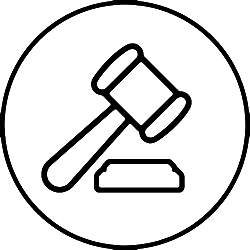One of the most important issues for those who are considering establishing a company or a co-operative, or for those who are managers or partners in an existing structure, is what “responsibilities” are. Who is responsible for what and to what extent when things go wrong is the foundation of these structures. This text aims to explain the basic responsibilities of co-operatives and joint stock companies in a language free of legal terms.
1. RESPONSIBILITIES OF MANAGERS:
Whether it is a co-operative or a joint stock company, the members of the board of directors are responsible for the management of the company. This important role brings with it serious responsibilities.
A. General Responsibilities: Doing the Work Well and Honestly
1.Basic Responsibilities of Managers: Care and Loyalty
Both co-operative and joint stock company managers are obliged to comply with two basic principles in the performance of their duties. These principles are the fundamentals that shape the decisions and actions of managers and at the same time make them accountable.
2. Duty of Care: Behaving as a Prudent Business Person
In conducting their business, managers should act with the care and diligence of a “prudent businessperson”. This includes having sufficient information when making decisions, making the necessary research and endeavouring to act in the best interests of the organisation (company or co-operative) they represent. Random, reckless, or insufficiently considered decisions and actions are a breach of this obligation. In particular, co-operative managers have an additional obligation to manage the affairs of the co-operative with all diligence, i.e. diligence and honesty.
3. Duty of Loyalty: Putting the Organisation’s Interest First
At all times and under all circumstances, directors must put the interests of the company or co-operative they manage ahead of their own personal interests or those of third parties. It is fundamentally contrary to the duty of loyalty to seek personal benefit at the expense of the company, to use the company’s resources or opportunities to their own advantage, or to engage in activities that may harm the company.
4. Breach of Obligations and Personal Liability
If these duties of care and loyalty are breached by the directors and the company or co-operative suffers damage as a result of such breach, the directors may be held personally liable for the damage. This may mean that the damages are not paid from the company’s coffers, but directly from the director’s own assets.
For cooperative managers, this manifests itself in the form of an obligation to indemnify themselves for damages caused by their own negligence.
For the members of the board of directors of joint stock companies, joint liability (joint and several liability) is generally the principle. However, if a member of the board of directors can prove that he/she disagreed with a decision that is considered to be unlawful and that he/she clearly recorded his/her disagreement in the minutes of the meeting, he/she may have the opportunity to be released from joint liability.
B. Liabilities Arising from Debts: Is the Company’s Debt the Director’s Debt?
1. General Rule: The Company and The Manager are Separate Entities
Under ordinary circumstances, managers are not personally liable for the debts of both the co-operative and the joint stock company. Debts are paid from the company’s or co-operative’s own assets. In other words, if the company owes money to someone, the creditor cannot take that money from the manager’s personal bank account or home.
2. Attention! There are Exceptions:
The most important exception to this rule is public debts (such as taxes, SSI premiums).
- If a co-operative or joint stock company fails to pay its debts to the state, such as taxes or social security premiums, and this debt cannot be collected from the assets of the company, the state may demand this money personally from the members of the board of directors as legal representatives. This is one of the most important financial risks for managers.
- An Additional Situation for Managers of Joint Stock Companies: If the managers neglect their legal duties (for example, if they do not take the necessary measures when the financial situation of the company deteriorates) and therefore the creditors of the company do not receive their money, the creditors may demand compensation for the damage they have suffered from the managers. For this purpose, it must be proved that the director is negligent and that there is a link between the damage and the negligence.
C. Criminal Liabilities: Imprisonment
The responsibilities of co-operative and joint stock company managers cover both the standards that they must comply with while performing their duties and the consequences that they may face in case of possible violations. These responsibilities can be analysed under the headings of duty of care and loyalty, liability for company debts, liability for public debts and criminal liability.
1. Duty of Care and Loyalty
A fundamental expectation for both types of managers is that they act in the interests of the organisation they manage. While co-operative managers are expected to manage the business honestly and diligently, joint stock company managers are expected to act “like a prudent businessman”, that is, to be prudent and diligent. This means that directors should not put their personal interests ahead of the interests of the organisation and should exercise all due care in the performance of their duties.
2.Liability for Company Debts (“Regular Debts”)
As a general rule, directors of co-operatives and directors of joint stock companies are not personally liable for the ordinary debts of the entity they manage. Since the company or co-operative is a legal entity, the debts belong to that legal entity. However, there are various exceptions to this rule. In particular, personal liability may arise in cases where the managers cause damage to the company or co-operative by their negligent actions.
3.Liability for Public Debts (Tax, Social Security Institution etc.)
Unlike the normal debts of the company, the situation of directors is more critical with respect to public debts (such as taxes, Social Security Institution premiums). Both co-operative managers and joint stock company managers may be held personally liable for non-payment of such public debts. This liability usually arises from the directors’ capacity as legal representatives.
4.Criminal Liability
In some cases, the actions of directors may constitute a criminal offence and may even result in imprisonment. It is important to note that the penalty is not imposed on the legal entity of the company or co-operative, but on the director, the natural person who committed the offence.
- Criminal Liability for Co-operative Managers: When co-operative managers commit certain offences in the course of their duties, such as embezzlement of co-operative funds or property, forgery of official documents, etc., they are punished “like civil servants”. This can mean that they are punished according to the relevant offence definitions in the Turkish Penal Code and often face more severe sanctions. In addition, failure to comply with the mandatory procedures set out in the Co-operatives Law (e.g., holding general assembly meetings in accordance with the procedures, keeping proper commercial books, etc.) may also result in penalties.
- Criminal Liability for Managers of Joint Stock Companies: The Turkish Commercial Code (TCC), especially Article 562, clearly states which actions of the managers of joint stock companies are considered as offences and what kind of penalties are envisaged for these offences. Examples of these offences are as follows:
- Providing false or fraudulent information to the public or the general assembly in important transactions of the company such as merger, spin-off, change of type or public offering.
- Deliberately misrepresenting or concealing the financial statements (balance sheet, income statement, etc.) of the company.
- Sharing trade secrets, customer information or production secrets of the company with unauthorised persons or using them for its own benefit.
- Making false statements regarding the subscription or payment of the capital. Such offences are punishable by imprisonment and/or judicial fines under the TCC.
In addition, applicable to both types of managers, if the managers commit offences that fall within the scope of general criminal laws, such as bribery, fraud, breach of trust, etc. in connection with their duties, they are also held personally liable for these offences and are punished in accordance with the relevant laws.
Therefore, it is of utmost importance for managers to be familiar with both the specific legislation of their organisations (Co-operatives Law, Turkish Commercial Code) and the general principles of criminal law and to conduct their activities within this framework.
5. Fundamental Principle for Managers
As a result, the basic principle for all managers is to conduct their business in accordance with the laws and the articles of association of the company, honestly, carefully and with the utmost care for the interests of the company. In any doubtful or hesitant situation, it is of vital importance for managers to seek the opinion of a legal advisor in order to avoid possible legal and criminal liabilities in order to protect both themselves and the organisation they manage.
Of course, we can make the content of the table comparing the areas of responsibility of managers more descriptive and organised:
Comparative Table of Manager Responsibilities
| Area of ResponsIbIlIty | Co-operatIve Manager | JoInt Stock Company Manager |
| Duty of Care and Loyalty | The affairs would be managed with honesty and diligence by those concerned, with a priority placed on the interests of the co-operative in accordance with the duties of a prudent manager. | The company’s interests must be observed by the board with honesty, and they are also obliged to fulfil their duties with the diligence of a prudent manager. |
| Company Payables (ORDINARY) | As a rule, he is not personally liable. However, statutory exceptions and, in particular, cases of liability arising from the fault of the manager are reserved. | As a rule, it is not personally liable. However, statutory exceptions, in particular damages caused by the fault of the board member and public debts, are excluded from this rule. |
| PublIc Debts (Tax, SocIal Security InstItuIon) | May be personally liable. In particular, the co-operative may be personally liable as a legal representative for tax and SSI debts that are not paid on time. | May be personally liable. In particular, due to the company’s tax and SSI debts that are not paid on time, personal liability may arise as a legal representative. |
| CrImInal Liability | For certain offences related to their duties (e.g. embezzlement, forgery of documents, abuse of office), they can be punished “like a civil servant”. There are also penalties for failing to comply with the obligatory procedures under the Co-operative Law (general assembly, bookkeeping, etc.). | There are special offences and penalties defined in the Turkish Commercial Code (in particular Art. 562). Examples: misrepresentation of the financial position of the company, irregularity in financial statements, disclosure of trade secrets. Imprisonment and/or a judicial fine may be prescribed. Liability also arises for offences under the general criminal law (bribery, fraud, etc.). |
2. RESPONSIBILITIES OF PARTNERS (MEMBER/SHAREHOLDER):
The responsibilities of shareholders (called “members” in co-operatives and “shareholders” or “shareholders” in joint stock companies) are also important.
A. Basic Responsibility: Payment of Capital!
Whether you are a member of a co-operative or a shareholder in a joint stock company, the most basic and usually the only financial obligation is to pay the subscribed capital to the company or co-operative.
- Co-operative Members: They are obliged to pay the partnership share and other dues, if any, specified in the articles of association.
- Joint Stock Company Shareholders: They pay the share price they have committed to the company. After paying this debt, as a rule, they are not obliged to pay any other money to the company.
B. Liabilities Arising from Debts: If the Company Fails, Will Money Come Out of My Pocket?
The answer to this question depends on the type of shared structure.
- Joint Stock Company Shareholders: Generally Limited Liability
- The fundamental rule in joint stock companies is that the liability of the shareholders is limited to the capital invested. In other words, a shareholder who contributes a certain amount of capital to the company loses at most the capital invested, even if the company goes bankrupt.
- Company creditors cannot apply to the personal assets of shareholders for company debts.
- Important: Shareholders of a joint stock company are not held personally liable for the company’s unpaid tax or SSI debts. This is an important difference from limited liability company shareholders and makes the joint stock company less risky for the shareholders.
- One Exception: If the subscribed capital has not yet been paid in full (e.g. part of it has been paid in advance and the remainder remains outstanding), the insolvency administration may demand payment of this outstanding capital debt if the company goes bankrupt. This is payment of a debt already owed to the company, not an additional contribution to the debt.
- Co-operative Members: Different Situation!
- Rule (Limited Liability): The main rule in co-operatives is that members are not personally liable for co-operative debts. Their liability is limited to the share capital and other fees paid by them. Creditors cannot directly apply to members for co-operative debts.
- Articles of Association may make a difference: The articles of association of a co-operative may have different provisions. These regulations may increase the responsibility of members:
- Unlimited Liability: If there is a provision in the articles of association stating that “members are liable for the debts of the co-operative with all their assets” (which is very rare), the members are personally liable for all debts in the event of the co-operative’s bankruptcy.
- Limited Additional Liability: The articles of association may state that “each member is additionally liable for a certain multiple of his/her share (e.g. 2 times) or a certain amount”. In this case, if the co-operative is unable to pay its debts, these additional amounts can be claimed from the members.
- Additional Payment Obligation: The articles of association may provide for additional payments to be made by members in the event of a loss on the co-operative’s balance sheet.
- Such additional responsibilities are only valid if they are expressly stated in the articles of association, and their subsequent addition usually requires the approval of a majority of the members.
- New and departing members: If the co-operative has additional liability, the new entrant is also liable for debts incurred prior to entry. Similarly, a member who leaves such a co-operative may continue to be liable for debts incurred before leaving if the co-operative becomes insolvent within a certain period (usually one year, but may be extended by the articles of association) after leaving.
C. Criminal Responsibilities: Being a Partner is Not a Crime
Merely being a member of a co-operative or a shareholder in a joint stock company does not in itself impose criminal liability.
- As a rule, criminal liability lies with the person who committed the offence. For an offence committed on behalf of a co-operative or a company, the members are not liable, unless they are involved in the management of the co-operative or company or are personally involved in the offence.
- However, if an offence is committed individually as a partner (for example, if a false document is issued with the intention to defraud the company or if unfair gain is made on the stock exchange through insider information), liability arises under the general criminal laws.
Comparison of Cooperative Member and Joint Stock Company Shareholder Responsibilities
| Area of ResponsIbIlty | Co-operatIve Member | JoInt Stock Company Shareholder |
| BasIc OblIgatIons and Loyalty (a more approprIate tItle than Care and Loyalty) | Comply with the provisions of the articles of association and the objectives of the co-operative. Pay the prescribed dues and other financial obligations on time. Avoid behaviour contrary to the interests of the co-operative. | Its basic obligation is to pay the company the price of the capital share it has subscribed for. It must respect the operation of the company and the rights of other shareholders, and avoid actions that may harm the company. |
| Company Payables (ORDINARY) | As a rule, members are not personally liable for the debts of the co-operative. However, if expressly provided for in the articles of association, additional payment obligations or limited/unlimited personal liability may be imposed on members. | He is liable only to the extent of the capital amount that he has committed to the company and has not yet paid. He shall not be held liable for the debts of the company (other than this amount) with his personal assets. |
| Public Debts (Tax, SocIal Security Institution) | As a rule, the co-operative is not personally liable for public debts such as taxes and social security contributions. Such responsibilities primarily belong to the managers. | The company is not personally liable for public debts such as tax and SSI. These debts belong to the legal entity of the company and the responsibility may be held by the managers within the legal conditions . |
| CrImInal LIabIlIty | Membership does not, by itself, give rise to criminal liability. However, individual criminal liability arises for offences committed by the member personally within or outside the scope of co-operative activities. | The title of shareholder does not bring criminal liability on its own. However, individual criminal liability arises for offences committed by the shareholder personally within or outside the scope of company activities. |
PAY ATTENTION
These explanations are for general information purposes. It should not be forgotten that each situation may have its own specific conditions and legal responsibilities require a detailed analysis. Consultation with a legal expert who is familiar with the current legislation is the best way to protect rights and avoid undesirable consequences in any legal process or decision regarding a company or cooperative.




















